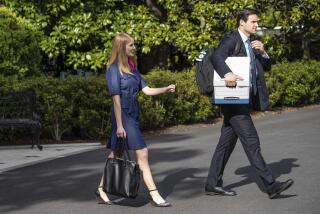Deaver Portrayed as Eager to Earn High Pay as Lobbyist
- Share via
WASHINGTON — Prosecution witnesses in the perjury trial of Michael K. Deaver portrayed the former White House aide Wednesday as a man who seemed intent on earning many times his government salary after leaving federal service to become an independent lobbyist in 1985.
In the first day of testimony at his trial, however, no witnesses came forward with evidence that Deaver had lied under oath--the only charge being considered by the jury. Rather, independent counsel Whitney North Seymour Jr., the chief prosecutor, called as his first witnesses those who might help establish that President Reagan’s former aide and close confidant had a motive for lying about his lobbying activities.
Seymour has told jurors that Deaver tried to protect his business with a cover-up aimed at defusing congressional and grand jury investigations into his affairs last year.
Consults on New Career
Kenneth A. Lazarus, a Washington attorney, testified that Deaver consulted him in January, 1985, about a post-government career to start four months later in May. Lazarus said Deaver was pleased and surprised when Lazarus told him he could easily make $500,000 a year as a self-employed lobbyist, matching an offer another Washington public relations firm had made him.
Deaver was earning $75,000 a year in his White House job, according to pay records introduced by Seymour.
According to Lazarus, Deaver became even more intent on starting his own firm when the attorney advised him that such a firm would be an asset that he could sell later for several million dollars, assuming the venture was successful.
“He didn’t realize how valuable he was, in my opinion,” Lazarus said, adding that Deaver had waived his attorney-client privilege to allow him to testify.
Lazarus said Deaver originally planned to go into business with Craig Fuller, another presidential assistant, until Fuller decided to accept an offer to become Vice President George Bush’s chief of staff. The attorney said he drew up a legal memorandum for the two men, calling the proposed firm Deaver-Fuller Associates Inc. and including federal rules “that apply to departing government employees.”
Under these ethics rules, former high officials such as Deaver are prohibited from contacting their ex-colleagues on behalf of a business client for 12 months after they leave government service. Such contacts are proscribed for even longer periods when the former official had direct supervision over the subject under consideration.
Another witness, Andrew Woods, deputy chairman of the British advertising firm of Saatchi & Saatchi, told of negotiating with Deaver in 1986 to buy Michael K. Deaver & Associates for up to $16 million. Under the proposed deal, Deaver would have received 86% of the proceeds.
Woods said the negotiations never reached a conclusion because of adverse publicity about the Deaver investigation.
C. Edward Meyer, former president of Trans World Airlines, told jurors that the airline hired Deaver in late May, 1985, in a futile effort to head off a takeover by New York financier Carl C. Icahn. He said that Deaver had volunteered to contact officials at the Transportation Department, including then-Transportation Secretary Elizabeth Hanford Dole, to support a TWA petition for the government to intervene.
But Meyer said that although TWA paid Deaver a fee of $250,000, he was not aware that Deaver ever contacted Dole or anyone else to help the airline. One of five counts of perjury against Deaver alleges that he lied in saying, “I don’t recall any government contact I made on behalf of TWA.”
Seymour has told jurors he will prove that Deaver contacted Dole and at least two other officials on behalf of the airline.
More to Read
Get the L.A. Times Politics newsletter
Deeply reported insights into legislation, politics and policy from Sacramento, Washington and beyond. In your inbox twice per week.
You may occasionally receive promotional content from the Los Angeles Times.










